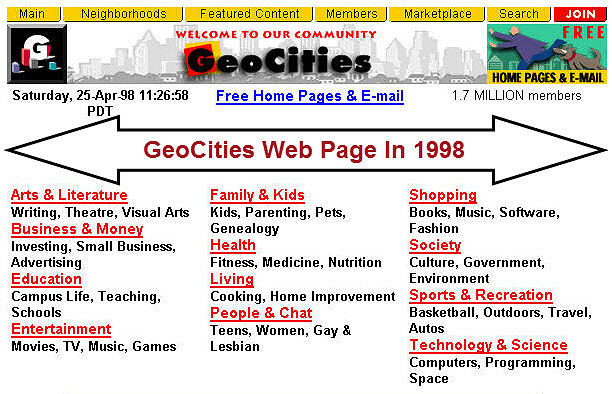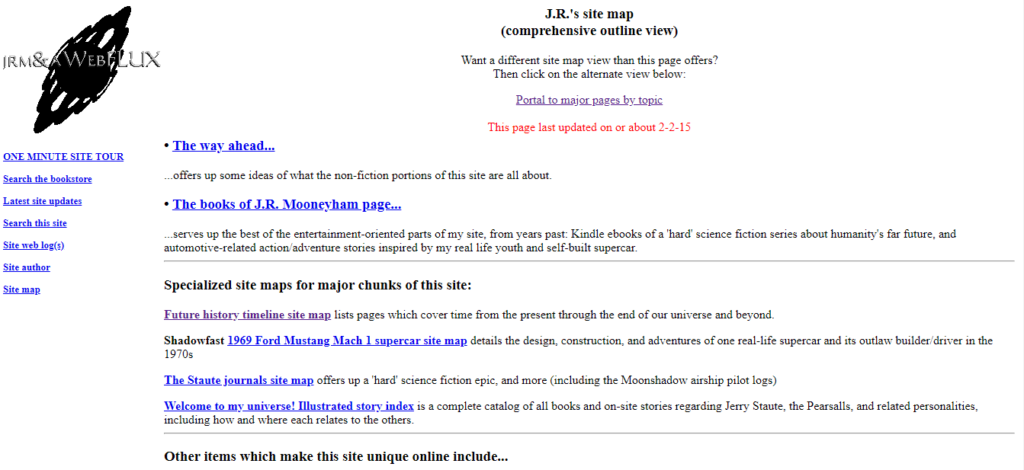
A previous essay on this page recounted the life cycle of Internet forums. The Second Hermetic Principle teaches us that as below, so above. As this essay will describe, the Internet itself is running on a life cycle – and we’re moving into the less enjoyable part of it.
The Golden Age of the Internet began in August 1995, with the release of Microsoft’s Windows 95. This operating system took the Internet out of the hands of the technological elite, and put it in the hands of the masses. This was the beginning of the personal computing revolution.
At first, the Internet appealed mostly to nerds, who had been starved of information thanks to the relative inefficiency of the book-and-library system. These nerds did what came naturally, which was to use the Internet to share information. They created all kinds of websites, most of them on subjects appealing to young men, like science, technology and engineering.
In the Golden Age of the Internet, websites consisted of little other than pure information and hyperlinks to more. Being restricted by bandwidth, websites focussed almost entirely on sharing the greatest quality of this info. Search engines such as Metacrawler indexed it all for ease of access. It was like having a library in every house.
The peak of the peak may have been around 2002, when an enormous number of small websites were available on GeoCities (later known as “GeoShitties”). This was also the peak of websites such as SlashDot, which appealed specifically to the programmers who were building the infrastructure of the Internet.
By 2003, the seeds of the decline had become apparent. Google AdSense was launched that year, which changed the web publishing game permanently. AdSense offered something truly revolutionary: cold, hard cash. But as is usually the case when cash is on the table, there were conditions.
The Google AdSense program was funded by advertisers, and those advertisers expected a certain degree of influence. In the same way that advertisers in newspapers 100 years ago exerted influence over what those newspapers published, AdSense advertisers pressured Google to not show ads on sites that carried certain content.
That meant content relating to illicit drugs, erotic literature, serial killers, violent anarchy and political extremism (i.e. all the interesting stuff) was produced less. This was the start of the great decline. Once Google AdSense money got involved, website owners started self-censoring to keep the shekels flowing in. The Golden Age of the Internet ended, and the Silver Age began.
The Silver Age of the Internet began on the 26th of September 2006, when FaceBook became open to everyone, and not just university students. This was the point at which social media really began to take off, a big deal because it meant that users could generate their own content. This steady stream of content could then be exploited by inserting advertising slots in it.
With the arrival of FaceBook, the Internet became a true commercial venture. Now there were billions of dollars involved. This was a Silver Age because of advertising, which corrupted the purity of the information. Although there was a greater quantity of information than ever, it had advertisements all through it.
The advertisers demanded more and more influence over the content. Eventually, FaceBook and YouTube became televisionised, with an extensive list of content restrictions. People started to get banned for calling each other ‘faggot’ or ‘nigger’. But still the Internet grew, to the point where the government decided that they had to get involved.
Once Big Government started to take an interest in what was being said on social media, and making up laws over who was allowed to say what, the Silver Age ended. The Bronze Age of the Internet began in April 2016, when Count Dankula was arrested for a YouTube video of a dog giving a Nazi salute. The freewheeling, freespeaking Internet of free expression was gone.
By the time of the Bronze Age of the Internet, there were so many retards online that much of cyberspace became detrimental to mental health. As the IQ of the average Internet user continued to decline, the quality of the average Internet experience became lower and lower. During the Golden Age of the Internet, the world’s retards bullied people for using computers – in the Bronze Age, they bully people by using computers.
If the Golden Age of the Internet saw its realisation, and the Silver Age saw its commercialisation, the Bronze Age saw its weaponisation. It was realised that, in the 21st Century, wars would be fought with information rather than bullets. The politicisation of the Internet saw people act to restrict the platform access of their ideological enemies.
By the time of writing this article, wrongthinkers are getting purged left, right and centre. Even websites like Reddit, founded in the twilight of the Golden Age specifically as a free-speech platform, are banning entire subforums on a weekly basis. It’s forbidden to discuss any subject that displeases the advertisers.
This has seen the rise and rise of imageboard culture, especially the chans such as 4chan. The ‘anything goes’ nature of these sites appeals to those who appreciated the Golden Age. In the Bronze Age of the Internet, those parts of cyberspace that still uphold the values of the Golden Age are dismissed as “cesspits”. This merely causes the appeal of the chans to grow further.
The Iron Age of the Internet is yet to begin. We can predict what it will look like: a totalitarian surveillance network in which the activities and social interactions of every citizen are tracked to the finest detail. 5G networks offer the bandwidth to transmit high-definition video footage faster than it can be viewed, and the advent of facial recognition technology means that they will know exactly where you are in real time.
Free speech restrictions might be bad now, but they can get worse. Improving AI tech will make it possible for any social media comment to be analysed and, if necessary, shadowbanned before anyone can see it. Even more ominously, the governments of all Western nations appear willing to increase Police harassment of online wrongthinkers.
When the Iron Age of the Internet is fully upon us, the Internet will be unrecognisably different from its Golden Age, much like today’s religions are radically different to those practiced during the Western spiritual tradition’s Golden Age in ancient Greece. We will then, as per Plato’s Republic, have to wait for a movement of philosopher-kings to overthrow the old Internet and institute a new one.
*
This article is an excerpt from Clown World Chronicles, a book about the insanity of life in the post-Industrial West. This is being compiled by Vince McLeod for an expected release in the middle of 2020.
*
If you enjoyed reading this essay, you can get a compilation of the Best VJMP Essays and Articles of 2019 from Amazon for Kindle or Amazon for CreateSpace (for international readers), or TradeMe (for Kiwis). A compilation of the Best VJMP Essays and Articles of 2018 and the Best VJMP Essays and Articles of 2017 are also available.
*
If you would like to support our work in other ways, please consider subscribing to our SubscribeStar fund. Even better, buy any one of our books!



